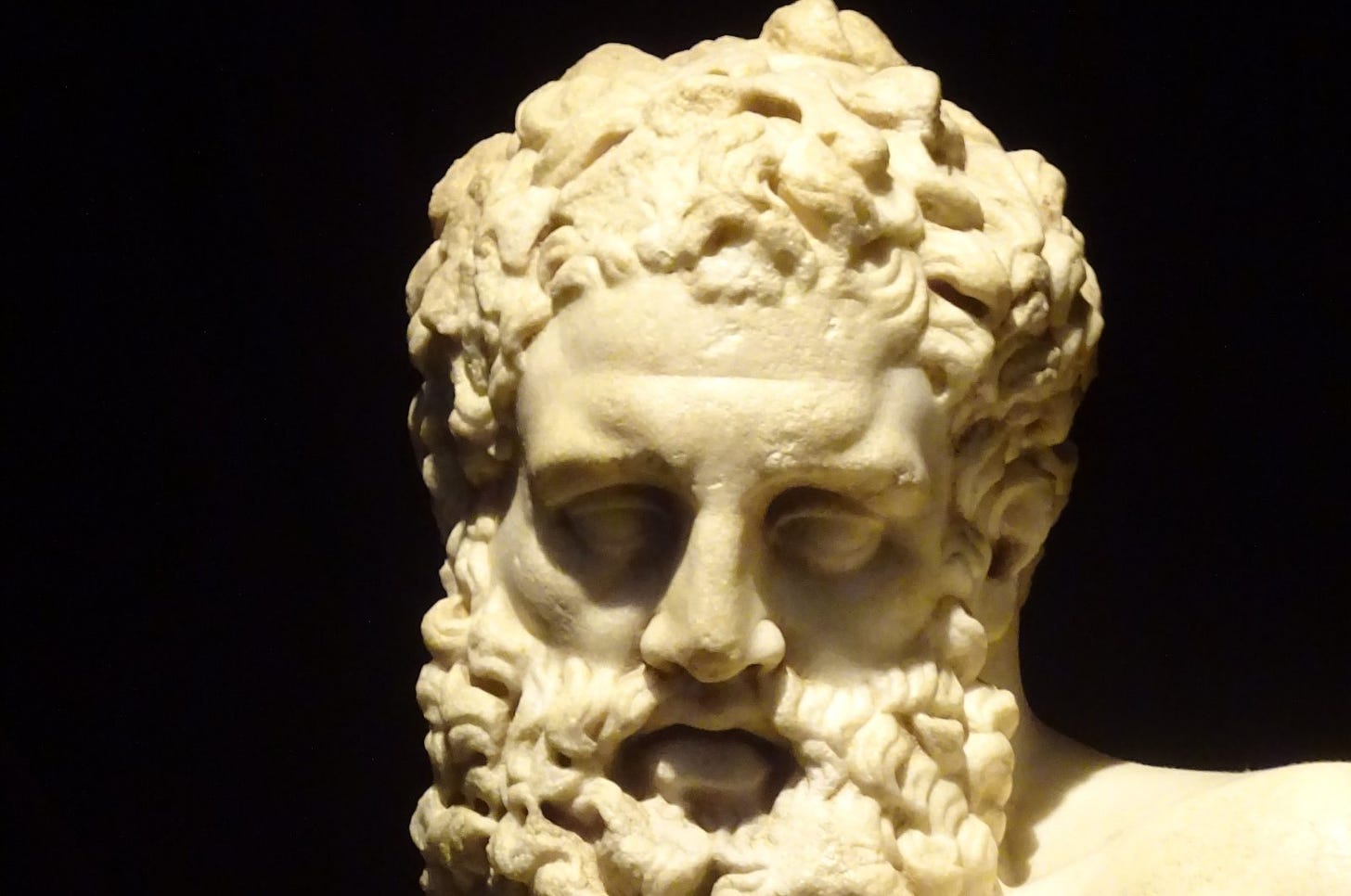Dear Classical Wisdom Member,
There is certainly more than meets the eye when it comes to Heracles. Despite being embedded in popular consciousness, the rare household name from the ancient world with bulging biceps and Disney branding, very few know the full life, labours, and fascinating symbolism of the conquering champion.
However, these were fundamental stories to the ancients, well known plots and characters that infused their legends.
This is because not only is he the quintessential hero... he is the proto-hero. The development of his myth with regards to his extraordinary strength and his profound connection to ancient cults reveals his prehistoric past, his pre-Greek existence.
Long before his tale was codified, his struggles represented the very real and incredibly dangerous struggle with the natural world, with beasts, spirits and fertility. His story is of civilization itself battling and overcoming nature.
Of course the Greeks certainly gave this once folk hero a thorough (if not at times well rounded) homage! While immortalized by the words of Homer, Hesiod and Ovid, perhaps it was the tragedians who best brought Heracles to life. Through the brilliant minds of Sophocles and Euripides the details of his quests and sorrows are materialized and preserved... even to this very day.
So today we will look at the original strongman, the legend of Heracles, in our Classical Wisdom Ebook, The Heraclean Plays: The Life, Death and Legacy of Heracles as seen in Greek Theater, below.
But first, in our usual tradition to both question everything and to whet the intellectual appetite, we ask: Why is Heracles so popular... even today?
Enjoy Ben Potter’s theory of the Popularity of Heracles below and then delve into the rich tradition of Athenian theater for the full fantastic experience.
All the best,
Anya Leonard
Founder and Director
Classical Wisdom
Truly there is no greater pleasure than entering the world of the sublime, the magic of the original texts, while guided with expert minds. Such is the experience of The Essential Classics.
Carefully compiled selections from the Greco-Roman world, collecting the greatest works from Homer to Marcus Aurelius, along with introductions, biographical sketches, maps and more. It is one beautiful hardback limited edition anthology that has been 100 years in the making. Learn more about this stunning book (currently heavily discounted for the holidays) here:
The Popularity of Heracles
By Ben Potter
“Oh yeah, I love the classics, too. Dickens, Dumas, Austen, Orwell...”
“No, when I said I'm into Classics I meant...”
“...Hemingway, Faulkner, Fitzgerald, Flaubert.”
“No, no, no! Not 'the classics'... 'Classics'.”
“Well, what's the difference?”
“Well Classics is all about Odysseus, Augustus and Alexander...”
*blank stare*
“...you know: Pericles, Poseidon, Plutarch, Plato...”
*blank stare*
“...you knoooow: Jason and Medea, Scylla and Charybdis.
*blank stare*
“...ummm... you know... Hercules.”
“Ah, Hercules! Why didn't you say?”
Okay, perhaps the above back and forth does indulge in a bit of dramatic licence, but it's not a million miles away from a real conversation I once had with a non-classicist (I was almost tempted to say 'with a Muggle', but with my surname I wouldn't dare).
The point remains that Hercules (or 'Heracles' if your classical compass points towards Athens rather than Rome) does seem to be some sort of gateway drug into the Classics. He's the link between those of us who think a symposium is a ritualised drinking party filled with witty badinage and musically talented prostitutes and those who think it's a conference attended by serious and sober-minded individuals.
The obvious question is: why?
Why, with such a pantheon of interesting gods, heroes, artists, warriors, historians, playwrights, poets, architects, engineers, philosophers and mathematicians to choose from, is the Heracles brand so instantly and enthusiastically recognized by the uninitiated?
Keep reading with a 7-day free trial
Subscribe to Classical Wisdom to keep reading this post and get 7 days of free access to the full post archives.





